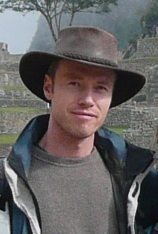Ronald Münze

Ronald graduated in 2004 from the Dresden University of Technology with a diploma in biology. His main research interest lies in the conservation of the natural environment.
In his diploma thesis “The ecological value of the Dresden Botanical Garden as a refuge for wild bees (Hymenoptera, Apidae) within the city of Dresden” he established a local bee species inventory which then got forwarded to the Saxon Ministry of the Environment.
Having lived in England for six years, where he volunteered with the British wild plant conservation charity Plantlife and later worked in the field of Legionella control, Ronald returned to Germany to get actively involved with scientific research again.
In 2010, he joined our team as a PhD student to investigate the effects of toxicants on aquatic macroinvertebrate communities, applying the trait-based bioindicator system SPEAR.
Professional experiences
Education
10/2010
- 2018
PhD student at the Helmholtz Centre for Environmental Research – UFZ
10/1997 – 02/2004
Study of Biology at the Dresden University of Technology
Publications
Ronald Münze, Dirk Langner & Matthias Nuss (2006). The wild bees of the Dresden Botanical Garden (Hymenoptera: Apidae). – Sächsische Entomologische Zeitschrift 1: 45-69.
Polina Orlinskiy, Ronald Münze, Saskia Knillmann, Mikhail Beketov, Matthias Liess (2015). Forested headwaters mitigate pesticide effects on macroinvertebrate communities in streams: Mechanisms and quantification. Science of the Total Environment 524-525: 115-123.
Ronald Münze, Polina Orlinskiy, Roman Gunold, Albrecht Paschke, Oliver Kaske, Mikhail A. Beketov, Matthias Hundt, Coretta Bauer, Gerrit Schüürmann, Monika Möder, Matthias Liess (2015). Pesticide impact on aquatic invertebrates identified with Chemcatcher® passive samplers and the SPEARpesticides index. Science of the Total Environment 537: 69-80.
